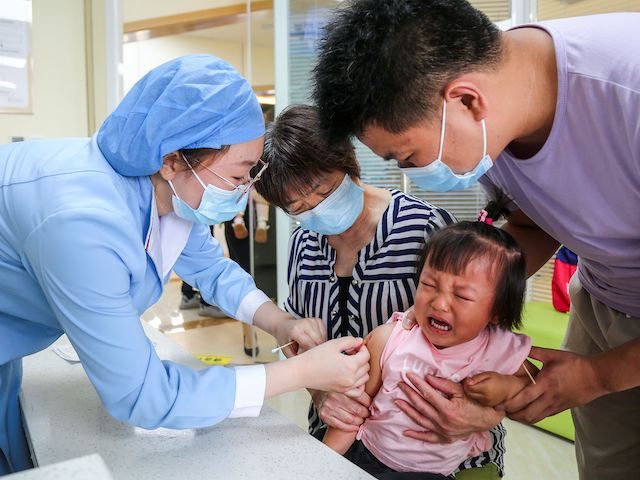China’s state-run Global Times on Tuesday touted “Phase II clinical trial data” that suggests the Sinovac coronavirus vaccine candidate is “at least 98.9 percent effective in producing antibodies” when administered to children from 3 to 17 years old.
The government propaganda outlet did not note results from that trial regarding the vaccine product’s ability to actually prevent coronavirus infections, which would depend on the number of antibodies produced, not just if any are present in patients at all.
The Global Times quoted Sinovac’s developers claiming the Phase II results suggest their vaccine is “stable and effective among young people.”
The report said:
The W.H.O. [World Health Organization] validated in June the Sinovac COVID-19 [Chinese coronavirus] vaccine for emergency use in people 18 years and older, noting that efficacy results showed that the Sinovac vaccine prevented symptomatic disease in 51 percent of those vaccinated, and prevented severe COVID-19 and hospitalization in 100 percent of the studied population.
The agency requires a minimum threshold 50-percent efficacy rating against infections – not efficacy at producing antibodies – for approval, meaning Sinovac’s “Coronavac” only barely met that requirement.
“Sinovac was approved for emergency use in May for people aged between 3 and 17. Multiple provinces and cities in China have inoculated teenagers aged 15 to 17 since July and are planning to expand inoculations to more people,” the Global Times added.
Countries relying on China’s vaccines have experienced dismaying coronavirus surges that suggest the vaccines are much less effective than China claims. Several of those countries, including Seychelles, Chile, Bahrain, and Mongolia, report substantially higher vaccination percentages than the United States, but still experienced troubling coronavirus surges. People vaccinated with Chinese products have reported coronavirus infections severe enough to require hospitalization.
Last week, Thailand decided to begin mixing AstraZeneca shots into its vaccination program instead of relying entirely upon Sinovac because hundreds of medical workers contracted the coronavirus after they were fully inoculated with the Chinese product.
Thailand also announced that healthcare workers who have received both Sinovac shots will receive a third injection using AstraZeneca or Pfizer vaccines. Thai citizens are stampeding into private clinics and paying premium prices to get U.S.-made vaccines instead of Sinovac.
Defenders of Sinovac and the other major Chinese vaccine, Sinopharm, insist they are reasonably effective at preventing severe or fatal infections. These defenders have scrambled to find other reasons for the persistent coronavirus spikes in nations that rely heavily upon Chinese vaccines, including theories that the inactivated-virus Chinese products are less effective against Chinese coronavirus variants than the newer mRNA technology used by the big Western vaccines.
Vaccinating young children against the coronavirus is controversial with some doctors, who argue the injections could provide minimal benefits with significant health risks, especially when using double-shot vaccines like Sinovac and Sinopharm. The United Kingdom is preparing to offer inoculations for children, but only over age 12, and primarily children who live with exceptionally vulnerable or infected people.

COMMENTS
Please let us know if you're having issues with commenting.